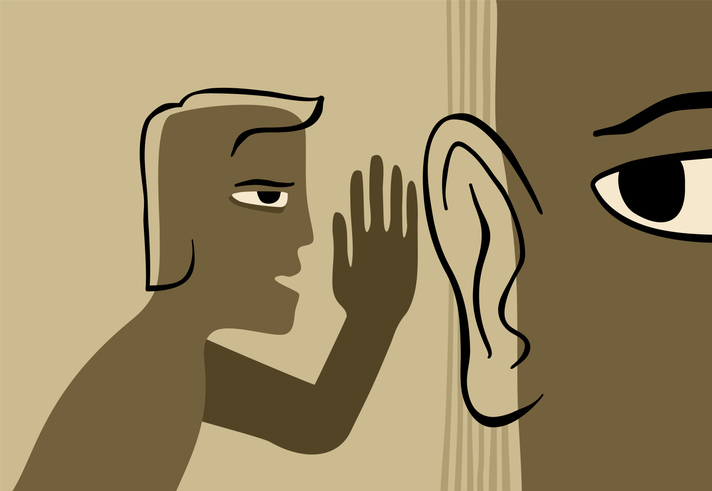Times magazine published an article about how 2022 became the year of gossip. Undoubtedly, there was no lack of drama last year with situations such as Johnny Depp’s trial against his ex-wife Amber Heard and Piqué’s cheating on Shakira.
The fact of not knowing celebrities does not mean that someone cannot feel related to them; this is known as a “parasocial relationship,” where someone feels close to a singer, athlete, actor, or any famous person they have been following his trajectory. So many people prefer to talk about themselves as it is a safe way to interact with others without feeling uncomfortable sharing information from their social circle.
The publication says that last year people were especially “thirsty” for gossip and drama after the pandemic lockdown. Situations and events like proms, parties, weddings, and other social events became remote, so seeing the lives of celebrities was a way to satisfy that thirst. But why do people yearn for gossip? Because people are social animals who need to know what is happening in their social environments.
In English, the word gossip comes from god-sibb, which, according to Wikipedia, means godfather in Old English. “In the early 19th century, the term was extended from the talker to the conversation of such persons. The verb to gossip, meaning “to be a gossip,” first appears in Shakespeare,” explains the portal.
According to a study published in the journal Social Psychological and Personality Science titled Who Gossips and How in Everyday Life? A person spends 52 minutes in a 16-hour day casually chatting with others, in other words, gossiping. Still, some talks aren’t about badmouthing others but sharing information from people close to you; in particular, there’s a lot of celebrity-centric gossip.
To gossip is to talk about a person who is not present. This is not about spreading malicious rumors or embarrassing stories, just sharing information. The study noted that of the 52 minutes participants gossip each day, sharing harmless details of everyday life is more common.
Furthermore, Gossiping can positively affect the community as it helps connect its members and make them feel like they are on the same page. It is a way of sharing experiences and concerns; gossiping fosters closer ties between two people when they share feelings about a third person.
Mark Leary, emeritus professor of psychology and neuroscience at Duke University, told Health magazine, “Gossiping is a fundamental human instinct because our lives are deeply rooted in groups. We not only live in groups, but we also depend on the people in our groups to survive.”
However, there are cases where a person is badmouthed, significantly when people deviate from cultural norms. This primarily serves to keep people in check, morally speaking. Also, to warn the community or social circle of someone else’s behavior and the consequences if someone else behaves that way.
In the previously mentioned study Who Gossips and How in Everyday Life? Participants wore a device that displayed what people were saying throughout the day, allowing the researchers to discover that younger people engage in more negative gossip than adults. Furthermore, most of the things that were spoken by the subjects were negative, and more about people they know than about celebrities.
A 2019 publication titled Self-Evaluative and Other-Directed Emotional and Behavioral Responses to Gossip About the Self investigated gossip and its relationship to performance. The authors wrote: “We predicted that gossip incidents have strong emotional consequences for their targets and that these emotional responses trigger different behaviors.”
According to the study, positive emotions such as pride and sympathy arise when someone hears something good from them. Hearing something negative results in feeling guilty and seeking to change or in anger, especially for those who care a lot about their reputation. This demonstrated that “gossip has other-directed and self-evaluative emotional consequences, which predict how people intend to react behaviorally after hearing gossip about themselves.”
In another research published in May 2019 in Frontiers in Psychology, researchers identified six distinct motives for gossiping: information gathering and validation, relationship building, personal protection, social enjoyment, and negative influence. The latter was the weaker motivation that led people to gossip. Gathering and validating information about the person being gossiped about was the strongest.
Gossip, cyber gossip, and cyberbullying
Cyber gossip is the virtual world equivalent of gossip and can be written messages, texts, images, and videos. Furthermore, it has the potential to reach a broad audience at any time and instantly. An investigation published in the scientific journal Comunicar describes cyber gossip as “a type of cyber behavior that involves the issuance within a group of two or more people of evaluative comments (positive, negative or neutral) about third parties who are not present.”
The dangerous thing is that, unlike saying something in person, the sender of the cyber gossip may not clear her message and cause many misunderstandings, which can lead to cyber-aggression and cyber-victimization behaviors and, therefore, to cyber-harassment. Numerous studies identify cyber gossip as an indirect form of group aggression since there are cases whose objective is to manipulate the reputation of another person or achieve their exclusion from the group.
Young cyberbullies emit behaviors that psychologically and morally harm their peers through social networks. Unlike face-to-face bullying, on digital platforms, people can be anonymous. In addition, it allows actions such as posting compromising photos, identity theft, threatening to share private information, and other aggressive behaviors.
Due to COVID-19, young people had access to the excessive use of cyberspace, which increased cyber gossip and cyberbullying as it stimulated it by giving access to a larger audience. From whispering gossip in the hallways, students frequently went on to share it on anonymous online accounts. One example is Stuyvesant High School in New York, whose students created a Facebook and Instagram profile called Stuyvesant Confessions, where they shared thoughts of others, such as admiring someone or bullying a student. But this school was not the only one; this happened in many institutions worldwide. Many of these pages already existed before COVID-19; however, due to the lockdown, they increased in popularity.
As explained above, society was “thirsty” for drama and gossip, and social media as servers on Discord, Google Hangouts, TikTok and Instagram, were great tools to satisfy that thirst and impact classrooms in a way adults cannot understand.
The 74 spoke to eight students from grades 6 to 12 and a university student “about their experience of social media’s impact on education post-COVID.” Most agreed that the pandemic initially forced them to rely more on digital platforms to stay connected with their peers, and they continue to do so.
Being able to gossip online despite the distance in several cases helped students stay together and learn more about each other, and even provide support if a classmate needed it. But it also caused a lot of gossip about how other students live.
Even when they returned to the classrooms, the profiles continued. For example, at a Los Angeles high school named Diego Camacho, students began taking photos of their classmates and posting them online anonymously without consent. These images contributed to spreading gossip about others.
These actions caused the students to be constantly worried about ending up in a publication and did things like avoid going to the bathroom or eating so they wouldn’t be photographed. It took the school administration two months to close the account, and while the page was active, it created a lot of mistrust among the students.
Gossip and mental health
WebMD, a page that provides news and information about human health and well-being, published an article on how gossip affects health. In this, he talks about how often they consider them harmless, but they can seriously affect the object of those talks.
The problem is that on many occasions, people cannot distinguish if gossip is the truth or not, mainly due to the internet and social networks, since news reaches them immediately, and sometimes confirming the data of a rumor takes longer. People sometimes give more weight to the latter than what they get from more credible sources or the person themselves.
The best example of this is Johnny Depp’s trial against his ex-wife Amber Heard since she published an op-ed accusing him of domestic abuse and sexual violence a year before. At first, many believed the actress without proof, which led the actor to lose million-dollar contracts. The case was televised, where both showed evidence in favor of her, and the jury ruled in favor of Johnny Depp; however, many do not believe in his evidence or that the trial was fair.
This case is also a great example of how “fake news” affects the person and society. For many, hearing about the trial can irritate their emotions and change their mood, whether for or against the outcome. Also, depending on the emotional intelligence of each person, his story, and his reaction, this can stay in his head for almost a year after it ends.
“On its own, gossip seems harmless, almost a fun pastime,” says WebMD, but it can become unhealthy. It can bring problems like exhaustion, anxiety, depression, post-traumatic stress disorder, panic attacks, guilt, and even suicide.
To know if someone is engaging in harmless gossip, just ask yourself how you would feel if the person you are talking to listened in on your conversation. Would you feel comfortable if they spoke of you in the same way? Does sharing that information have any positive benefit to you and the listener? How to build empathy or impart some vital knowledge? The gossip will likely be harmful if you answer no to one or both questions.
Translation by Daniel Wetta
This article from Observatory of the Institute for the Future of Education may be shared under the terms of the license CC BY-NC-SA 4.0 
)
)


)